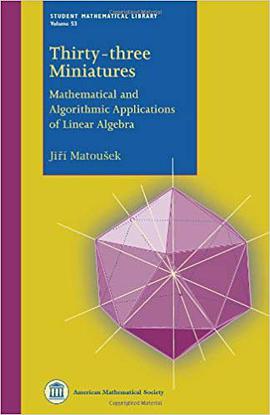Thirty-three Miniatures
内容简介
This volume contains a collection of clever mathematical applications of linear algebra, mainly in combinatorics, geometry, and algorithms. Each chapter covers a single main result with motivation and full proof in at most ten pages and can be read independently of all other chapters (with minor exceptions), assuming only a modest background in linear algebra. The topics include a number of well-known mathematical gems, such as Hamming codes, the matrix-tree theorem, the Lovasz bound on the Shannon capacity, and a counterexample to Borsuk's conjecture, as well as other, perhaps less popular but similarly beautiful results, e.g., fast associativity testing, a lemma of Steinitz on ordering vectors, a monotonicity result for integer partitions, or a bound for set pairs via exterior products. The simpler results in the first part of the book provide ample material to liven up an undergraduate course of linear algebra. The more advanced parts can be used for a graduate course of linear-algebraic methods or for seminar presentations. Table of Contents: Fibonacci numbers, quickly; Fibonacci numbers, the formula; The clubs of Oddtown; Same-size intersections; Error-correcting codes; Odd distances; Are these distances Euclidean?; Packing complete bipartite graphs; Equiangular lines; Where is the triangle?; Checking matrix multiplication; Tiling a rectangle by squares; Three Petersens are not enough; Petersen, Hoffman-Singleton, and maybe 57; Only two distances; Covering a cube minus one vertex; Medium-size intersection is hard to avoid; On the difficulty of reducing the diameter; The end of the small coins; Walking in the yard; Counting spanning trees; In how many ways can a man tile a board?; More bricks--more walls?; Perfect matchings and determinants; Turning a ladder over a finite field; Counting compositions; Is it associative?; The secret agent and umbrella; Shannon capacity of the union: a tale of two fields; Equilateral sets; Cutting cheaply using eigenvectors; Rotating the cube; Set pairs and exterior products; Index. (STML/53)
......(更多)
作者简介
Jiří Matoušek: Charles University, Prague, Czech Republic
......(更多)
目录
Cover 1
Title page 2
Contents 4
Preface 6
Notation 10
Fibonacci numbers, quickly 12
Fibonacci numbers, the formula 14
The clubs of Oddtown 16
Same-size intersections 18
Error-correcting codes 22
Odd distances 28
Are these distances Euclidean? 30
Packing complete bipartite graphs 34
Equiangular lines 38
Where is the triangle? 42
Checking matrix multiplication 46
Tiling a rectangle by squares 50
Three Petersens are not enough 52
Petersen, Hoffman–Singleton, and maybe 57 56
Only two distances 62
Covering a cube minus one vertex 66
Medium-size intersection is hard to avoid 68
On the difficulty of reducing the diameter 72
The end of the small coins 78
Walking in the yard 82
Counting spanning trees 88
In how many ways can a man tile a board? 96
More bricks—more walls? 108
Perfect matchings and determinants 118
Turning a ladder over a finite field 124
Counting compositions 130
Is it associative? 136
The secret agent and umbrella 142
Shannon capacity of the union: a tale of two fields 150
Equilateral sets 158
Cutting cheaply using eigenvectors 164
Rotating the cube 174
Set pairs and exterior products 182
Index 190
Back Cover 194
......(更多)
读书文摘
......(更多)






